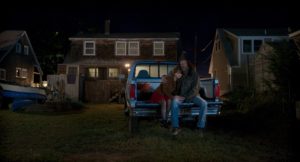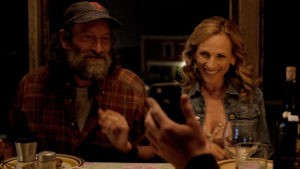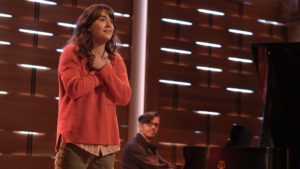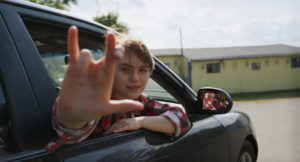I Have a Love-Hate Relationship With 'Love Hard'
Love Hard is a Christmas romcom about two people who fall in love while pretending to date. It’s a romantic and fun watch. If you can forget the catfishing.


Deaf representation is hard to find in media. It’s especially difficult to find in mainstream film where the Deaf community has been rendered practically invisible. But the National Center for Health Statistics estimates that about 10% of the U.S. population (28 million people) have some degree of hearing loss, and that about 2 million of that group are considered Deaf. So why don’t we see more Deaf and hard of hearing people onscreen? And when we do, why are they often played by hearing people?
Hollywood and popular media tend to relegate all people with disabilities to the joke, the caricature, the invisible. They use people with disabilities as props to non-disabled people’s stories in order to assuage their guilt.
However, recently Deaf representation in movies has been making steps forward. Modern mainstream audiences were exposed to Deaf characters and ASL in the 2018 horror hit, A Quiet Place. There, Millicent Simmons, a Deaf actress, portrays a Deaf protagonist. It made waves in the Deaf community for having a Deaf actress instead of a hearing one portray a Deaf character, and because ASL is the primary language of the movie.

Now, CODA is another step forward for Deaf representation in film. The story follows Ruby, a CODA (child of Deaf adults), the only hearing member of her family as she faces a crossroads in her life: stay and help her family start their fishing business or leave for college to pursue music.
There are so many good things about this film: the casting, the acting, seeing Deaf people onscreen. However, there are some things that aren’t so good: the negative portrayal of a CODA’s life, showing deafness as a burden, and the lack of racial diversity.

The casting for CODA is fantastic. The Rossi family are all Deaf, and their actors are, too. Each person gives an amazing performance. A particular standout is Troy Kotsur as Frank Rossi, Ruby’s dad. Frank is a crude jokester full of heart. Kotsur has perfect comedic timing in his many funny scenes, particularly in the doctor’s office and later when he gives “the talk” to Ruby and Miles. His body language and facial expressions make for an entertaining and energetic performance. During the scenes when he’s surrounded by talking people, he perfectly conveys the confusion and discomfort of feeling out of place when you can’t understand what’s going on. Kotsur also shines in the most compelling and intimate moment in the film — when he places his hands on Ruby’s neck so he can feel her singing to him. It’s a tear-jerking moment, especially given that it parallels a real-life moment Kotsur had with his own daughter. In an interview with NPR, Kotsur recalled,
“A long time ago when she was in kindergarten, she sang for a class performance. I asked, ‘can I just kind of feel your neck?’ And it was very cute. And then all those years later, the movie CODA was a real flashback where I did the same thing.”

Famous actress Marlee Matlin also stars as Jackie Rossi, Ruby’s mom. Her chemistry with Kotsur is amazing, and the pair make a great comedic duo. Daniel Durant as Leo Rossi gives a stellar performance as Ruby’s snarky, insecure older brother. He and Ruby share many moments throughout the film that can only be described as peak sibling energy.
Emilia Jones does a fantastic job as Ruby, the protagonist. Her voice, her expressions, and her ASL are very well done — it’s surprising when you realize the actress wasn’t actually raised by Deaf parents. (Her voice is also beautiful.)
In some ways, the portrayal of the Rossi family is amazing. They are crude, blatantly honest, cheeky, and loyal. They feel like a real family. They show that deafness is not a monolith. Unlike previous depictions of people with disabilities, their sexuality is not stripped away. In fact, every Rossi is very sexual. They seem like real, flawed people. Frank and Jackie are not perfect parents, but they are trying their best. Leo is a jealous brother, but he still loves his sister deep down.

The movie also doesn’t shy away from the uncomfortable situations they are put in, and how their reactions may not be entirely good (at first). This is best shown during Ruby’s concert. It was an interesting choice to show how the family experienced Ruby’s concert without sound — how they felt left out and out of place. Showing their journey of acceptance toward their daughter’s aspirations was done in a nuanced fashion. The family doesn’t automatically accept her dreams because, at first, they don’t completely understand her love of singing (especially Jackie). This is understandable because they may not feel they can connect with her anymore or appreciate her talents properly. Luckily, the family do come to realize that they are being selfish and letting fear get the best of them. They overcome their fears for the sake of supporting their daughter, as she has always supported them. This message was a positive one.

However, the messages about deafness being a burden were very negative. Ruby only ever complains about living in a Deaf household. She’s completely overworked. She has to listen to her parents having sex. She has to haggle for their business. She’s bullied at school. She has interpret for her family everywhere they go. Sure, these things may be true for real CODAs. But Ruby’s life as a CODA is only portrayed as a burden. Are there any benefits to living in a Deaf household? We don’t know because the movie doesn’t give us any examples.

Ruby’s story in CODA is full of cliches. She’s the “black sheep” of her family, she has dreams of going to a renowned college far away, she likes a guy that’s “out of her league,” etc. By the end of the movie, Ruby’s wants are all fulfilled: she gets to pursue her dreams, she miraculously gets into the prestigious college and somehow doesn’t have to worry about the expenses, and she gets the guy. The movie details her entire journey so it makes some sense when she reaches the end. As for her family, things are less clear. Ruby leaves home, and suddenly her entire family integrates perfectly in the hearing community during a short montage. How did this happen so quickly if the family was struggling to succeed their entire lives? Frank lost his fishing license — how did he get it back so their business could thrive? How did Jackie suddenly start getting along with the other wives? How did Leo suddenly become best buds with the same men who were previously so cold to him? There were a lot of loose ends when it came to the Rossis’ story and they weren’t truly resolved. Instead, the film shows vague notions of happiness and closure, but delivers no real closure.

But the movie does show love and familial support. And it gets more Deaf people onto audience’s screens. These characters are relatively well-rounded and played by real coda deaf actors, making for amazing representation compared to previous films. However, the cast for the film is primarily white, as is the Rossi family. What potential could there have been for intersectional representation had the Rossi family been people of color? We don’t know. But CODA does show that filmmakers can and should continue to make films about Deaf people, and that the film industry is finally treating them with the respect they deserve.
Related lists created by the same author
Love Hard is a Christmas romcom about two people who fall in love while pretending to date. It’s a romantic and fun watch. If you can forget the catfishing.
Related diversity category
Do not trust Rotten Tomatoes. That is what I learned after watching Eternals. Critics currently rate it a 48%, but it's an amazing character-focused Marvel movie with positive diverse representation.
Related Movie / TV / List / Topic
Marvel’s animated show What If...? ended last week, so let’s go back and look at all of the different universes shown and rank each episode from worst to best!